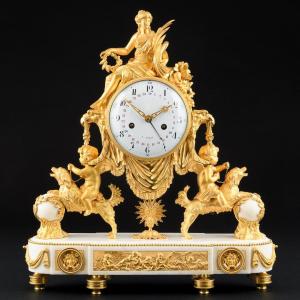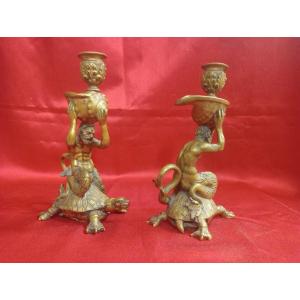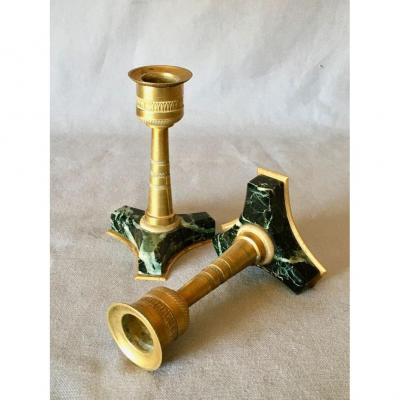See our website for more detailed photos: LINK
We send this article worldwide, professionally packaged, with registered and fully insured shipping at a fair price.
A sophisticated and large pair of gilt bronze Empire candlesticks, attributed to Claude Galle (1759-1815). The vase shaped candleholder, adorned with intricate decorative motifs and resting on a drip-pan, is supported by three classical female caryatid heads. Each figure is depicted wearing an elegant classical headdress adorned with a floral band, accompanied by a string of beads encircling their necks. Descending from this point, the tapering fluted stem is segmented by several elaborately decorated annular bands, culminating in three pairs of human feet positioned upon a circular base. The base itself is exquisitely embellished with concentric patterns of leaves and pearl rings, showcasing a striking contrast between matt and burnished gilding.
This remarkable pair of Empire candlesticks, featuring classical female herms, is associated with the oeuvre of the renowned bronzier Claude Galle, who supplied variations of this model to the Château de Fontainebleau in 1804. It is highly plausible that this extraordinary pair was crafted following a design by the eminent Empire designer Charles Percier (1764–1838), as evidenced by a corresponding drawing preserved in the Musée des Arts Décoratifs in Paris. This drawing is part of a small album that functioned as a catalogue for a Parisian bronzier.
Numerous candlesticks of a similar design were produced during the Empire period. While some models incorporated Egyptian female busts, others, like the present pair, were inspired by classical Roman aesthetics. By approximately 1810, such candlesticks had become highly fashionable among Parisian society, with their popularity bolstered by the publication of similar designs in contemporary catalogues, often utilised by prominent bronziers such as Claude Galle.
This grand pair of French Empire candlesticks retains its original matt and burnished mercury gilding and remains in excellent condition.
Origin: France, Empire period, circa 1805-1810.
Dimensions: Height 33 cm (13″), Base diameter 14 cm (5.5″).
Literature
- Hans Ottomeyer & Peter Pröschel, “Vergoldete Bronzen, Die Bronzearbeiten des Spätbarock und Klassizismus”, München 1986, p. 326.
- Jean-Pierre Samoyault, “Pendules et bronzes d’ameublement entrés sous le Premier Empire”, 1989, p. 175.



























 Le Magazine de PROANTIC
Le Magazine de PROANTIC TRÉSORS Magazine
TRÉSORS Magazine Rivista Artiquariato
Rivista Artiquariato